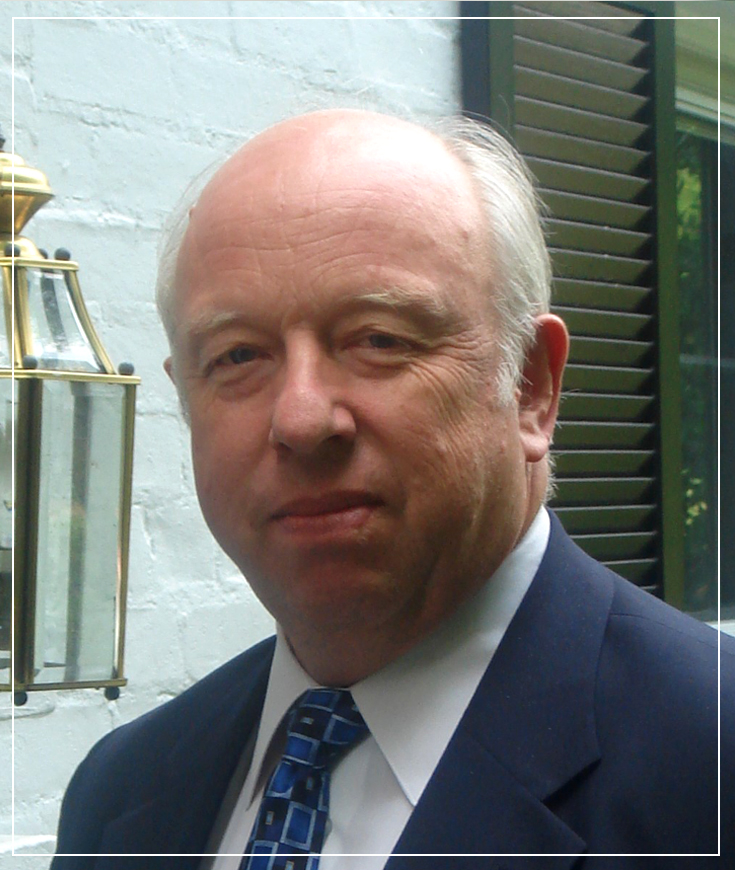
The Triumph of Good
Divine Providence, The Cain-Abel Paradigm,
And the End of Marxism
About the Author
An Experiential Odyssey
Thomas Cromwell was born in 1948 into a Christian community called the Bruderhof, located in Shropshire, England. He emigrated to America with his parents in 1962, where he would remain for thirteen years before beginning a twenty-five-year period living and working in the Middle East, based at different times in Egypt, Jordan, Cyprus, Greece and Turkey. His four children were born in the region. In 2000 he returned to the United States, where he lives today.
Living in the Middle East was a mind-expanding experience for him. It marked his first deep encounter with other than Judeo-Christian cultures, providing him with insight into both the commonalities and differences of the three great monotheistic religions and their roles in both religious and secular societies and nations. Coming from pre-9/11 America, he had only vague ideas about Islam. By living for years in Muslim-majority countries, where he studied the Quran and both Sufi and fundamentalist strains of the faith, he came to know this rapidly-expanding religion well. He was also intrigued by Israel’s divide between secular and religious Jews, and by the traditions of the Eastern Orthodox Churches, including the monastic orders on Mount Athos.
In the Arab world he encountered for the first time authoritarian regimes, of both the pseudo-democratic variety—so-called socialist ‘republics’—and the monarchic variety—kingdoms and emirates. Here, the impact on people’s lives of good and bad government, of democracy and dictatorship, was all too apparent, and he realized that all authoritarian governments typically have no appreciation of, or respect for, individuals and their rights.
Here too he observed the way that highly politicized media—most outlets in the region are government-owned or controlled—worked to exacerbate misunderstandings and fuel conflicts, whether political, ideological, national, ethnic or sectarian, prompting him to get involved in journalism to try and provide trustworthy and unbiased news coverage.
After gaining experience as a journalist and editor on the Jordan Times, he launched the Middle East Times, an English-language weekly designed to promote better understanding and relations among the peoples and nations of the region. The newspaper was supported by News World Communications, the parent company of The Washington Times. As publisher and editor for eighteen years, he followed regional and international events closely, producing over 900 weekly commentary pieces on Middle East and global issues.
While in the Middle East, he also organized a series of conferences for participants from all the countries of the region—on themes such as trade and peace, culture and conflict, agricultural and industrial development—as well as interfaith programs. These were pioneering initiatives for the region at the time, giving leaders in typically hostile states a rare opportunity to meet one another in ‘neutral’ locations such as Rome, Paris, London, Athens and Istanbul. This work added to Cromwell’s understanding of national and international issues and the interests that motivate individuals and governments to take action, for good or for bad.
While based in Greece, where he launched the weekly Greek News newspaper, Cromwell took several trips into East Bloc countries, starting with those that surround Greece and eventually, by the end of the Cold War, reaching all of them, including the Soviet Union. In these countries he learned of the realities of life under Communism and how an atheistic ideology translates into totalitarian government and oppression of its citizens.
As relations across the Iron Curtain eased towards the end of the 1980s, he was able to organize a series of three interdisciplinary conferences to bring East and West Europeans together on issues of mutual importance, including culture, education and environmental pollution. These were held in Dubrovnik, Budapest and Varna, respectively.
In the 1990s, Cromwell began doing country-focused reports for The Washington Times, and later for The Washington Post. These reports were produced in collaboration with government and private sector leaders in countries seeking to promote their issues, including development of trade, investment and tourism. Writing and producing them gave him a unique opportunity to see countries from a very broad perspective through the eyes of leaders in government, business and non-profits, as well as ordinary citizens.
This work would develop into providing a broad range of branding and communications services to nations, an activity which he pursues to this day. His diverse projects have taken him to 130 countries so far, and he continues to travel and learn about people, ideas, institutions and nations.
A Spiritual Odyssey
At the same time, Cromwell has been on a spiritual odyssey. The Bruderhof he grew up in was a pacifist community that taught Christian values which required members to make a total break from ‘normal’ life, including giving up all of their private property. Established in Germany in 1920 in imitation of Jesus’ first disciples who also pooled their possessions, it was inspired largely by the Christian Socialism movement that developed in Europe in the 19th century. This movement saw socialism as a way for Christian ideals to be translated into government policies and programs. To this day, the Bruderhof tends to align with movements of the Left.
Cromwell appreciated the moral values of the Bruderhof but came to question its global assumptions and outlook. For example, he wondered how the solution to evil everywhere was for everyone on earth to give up their property and join a Bruderhof-like religious community. How could people of diverse faiths, or no faith at all, adopt the Bruderhof belief system? And if pacifism was an absolute condition of faith, how would agents of evil, such as Hitler and Stalin, ever be stopped? (Indicative of its radical pacifism, the Bruderhof did not agree with Dietrich Bonhoeffer’s decision to participate in a plot to kill Hitler.) Finally, assuming God to be a loving Parent of all humanity, what exactly was God’s will for us today, two millennia after Jesus walked the earth?
Cromwell’s thinking on these and other global issues was deepened and expanded when, during a period away from the Bruderhof, he encountered the teachings of Sun M. Moon, a man who had profound insights into the Bible and Divine Providence, and who had experienced the horrors of Communism when he was worked to the edge of death in a North Korean prison camp. These teachings, known collectively as the Divine Principle, contain many of the insights used and interpreted in The Triumph of Good, including the purpose and nature of creation, the cause of the Fall, the importance of the Cain-Abel relationship in history, the process and path of Divine Providence and the Satanic nature of Marxism.
Together, these insights have provided him with a framework for understanding the intrinsic compatibility of religion with science, the true nature and threat of materialist ideologies—from Rousseau and Marx to Marcuse and Foucault—and the potential for people of diverse faiths and good will to work together to combat and defeat materialism. In sum, these insights have inspired Cromwell’s belief that the defeat of evil and the triumph of our Creator’s original, good purpose is possible.

